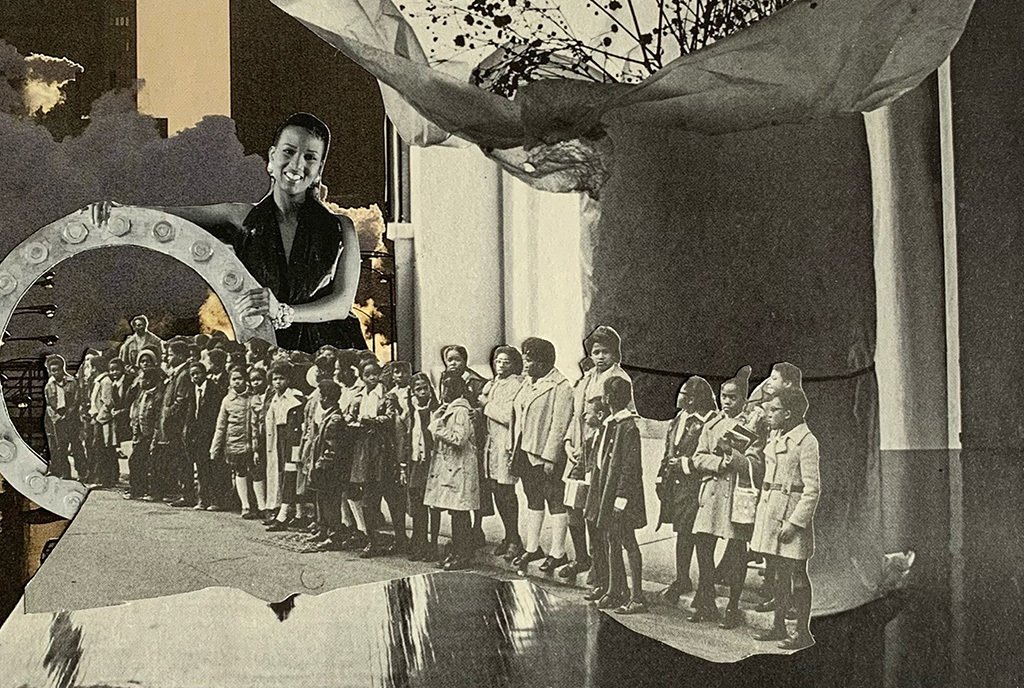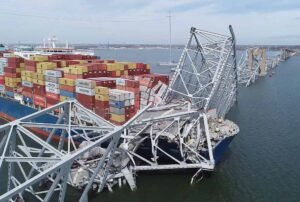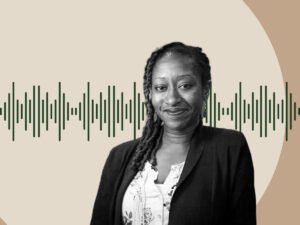
Editors’ note: This article is from Nonprofit Quarterly Magazine’s fall 2023 issue, “How Do We Create Home in the Future? Reshaping the Way We Live in the Midst of Climate Crisis.”
As we continue to find climate solutions, an important one often gets overlooked: investment in youth and young adults. I found my way to climate justice organizing and journalism through a mix of personal interest and lived experience—but what if learning how to address climate change and to protect biodiversity and the vastness of the green industry was grounded in everyone’s early education and was a readily accessible career pathway?
Creating pathways to instill early access to climate education and environmental stewardship opportunities is a way to equip the next generation with the knowledge and tools to adapt to and mitigate the climate crisis. Boston’s citywide Green New Deal is one such pathway. Part of the effort led to the creation of PowerCorpsBOS, a program launched in June 2022 that was designed to provide young adults with career-readiness support and connect them to employers in Boston within the green industry.1
Boston’s Green New Deal and PowerCorpsBOS
Investing in the climate future of youth and young adults is the way Trinh Nguyen, chief of worker empowerment, and Mariama White-Hammond, chief of environment, energy, and open space, saw the way forward to investing in Boston’s Green New Deal.
Boston’s Green New Deal is a series of interrelated policies addressing climate, environmental, racial, and economic injustice.2 When the bill was proposed, in April 2019, the lead sponsor was Michelle Wu, who was then a city council member.3 After Wu was elected mayor, in late 2021, Boston’s Green New Deal came to fruition under her administration.4 It is a $2 billion capital investment in clean energy5 that aims to get Boston to total renewable energy and carbon neutrality by 2040, and to develop the green workforce and center food and transportation justice, among other goals Wu had highlighted as councilor.6 The city launched a Green New Deal for Boston Public Schools, which aims to turn Boston’s K–12 schools into full-service community hubs that can meet the changing needs of students and their communities, and also published its first Urban Forest Plan.7
Investing in the climate future of youth and young adults is the way Trinh Nguyen, chief of worker empowerment, and Mariama White-Hammond, chief of environment, energy, and open space, saw the way forward to investing in Boston’s Green New Deal. PowerCorpsBOS, launched in June 2022, is a green jobs program designed to provide young adults with career-readiness support and connect them to employers in Boston within the green industry.8 “When we think of climate action and being green, we think about everything from how buses run to how buildings are maintained,” said Nguyen.9 Fitting those daily realities into the lives of working-class people and families is critical and the main focus of the Deal.
PowerCorpsBOS is specifically designed for young adults ages 18–30, who are underemployed and not in college or on a career track, and who are interested in the green industry and hands-on training; priority is given to youth experiencing homelessness, young people who have been in foster care, and other marginalized communities.10 Boston’s first Urban Forest Plan aims to expand the city’s tree canopy, particularly in neighborhoods considered “heat islands,” such as East Boston, Mattapan, and Roxbury.11 The plan led to establishing an urban forestry division with 16 full-time permanent roles that include arborists, tree wardens and tree equipment operators.12 PowerCorpsBOS is giving graduates the necessary skills for applying for such roles. As part of the program, graduates have the opportunity to learn smart building technology, or to become certified in pesticide application,13 enabling them to practice or supervise the use of restricted pesticides in accordance with state, Tribal, and federal regulations. (Importantly, this certification “allows them to help with one of our pernicious problems…the emerald ash borer, which is attacking trees throughout the state,” explained White-Hammond.14)
The green jobs program is grounded in Nguyen’s and White-Hammond’s longtime community-based youth advocacy and organizing that started in Boston over 20 years ago.15 In the late 1990s, Nguyen worked with the Coalition for Asian Pacific American Youth,16 and by the early 2000s became director of development at the Boston Women’s Fund.17 White-Hammond started her work in youth organizing at the age of 13, and she became the director of Project HIP-HOP—an organization founded in 1993 as a program of the ACLU—in 2001. (That same year, it became an independent entity, but it was discontinued in 2016.18) The 2005 Hurricane Katrina disaster, which battered the Gulf Coast, helped lead to White-Hammond’s realization that race and climate were linked.19 Hurricane Katrina started White-Hammond on the path to environmental justice activism, while Nguyen established her career in education access and workforce development within the Boston city government and in community nonprofits.20
A Longtime Youth-Organizing Strategy
When Nguyen and White-Hammond both found themselves in top leadership positions in the Boston city government, one of their first conversations was how to help young people get jobs.21 In 2021, the pair gathered partners from both of their offices and convened for three months to understand what the green job landscape was in Boston. Then, White-Hammond looked at research that then-city councilor Kenzie Bok’s office had started, to understand which cities across the country had successfully launched young-adult green jobs pathway programs. The research looked at programs in cities such as DC and Phoenix;22 but the program that caught White-Hammond’s eye was Philadelphia’s PowerCorpsPHL—which is now in its tenth year and has graduated over 20 cohorts.23
PowerCorpsBOS exists to strengthen workforce development and career pathways for the green economy, and sits at the intersection of climate, racial, and economic justice.
In October 2021, White-Hammond visited Philadelphia to learn more. There, she met Aaron Kirkland, who was a 2015 participant of PowerCorpsPHL and was formerly incarcerated prior to his time in the program.24 PowerCorpsPHL set him on a green career path that helped him to grow his skills and access upward mobility. Today, he is the supervisor overseeing 24 people for the Philadelphia Water Department.25 “Seventy percent of Kirkland’s current team are graduates of PowerCorpsPHL,” said White-Hammond. This inspired White-Hammond to explore replication of the program in Boston.26
Two key elements that PowerCorpsBOS mirrors from PowerCorpsPHL is reaching people from neighborhoods that are chronically underemployed and creating opportunities for formerly incarcerated persons. Often, this demographic faces employment discrimination,27 which is a key component of recidivism. By helping its graduates access permanent employment, the program is “putting all those pieces into place so that we can go from a dream and something that we’re committed to, and a values-based investment in a program that is serving real folks,” said White-Hammond.28 The key questions Nguyen continues to sit with are, “What does the green economy mean for young people?” and “How do young people see themselves in the climate-ready movement?”29
The Impact of PowerCorpsBOS
PowerCorpsBOS exists to strengthen workforce development and career pathways for the green economy, and sits at the intersection of climate, racial, and economic justice. “Our job is to make sure that all Boston residents and young people get access to some of the opportunities as a by-product of this Climate Ready Boston movement,” said Nguyen.30 To do so, the city had an RFP out for a Green New Deal workforce assessment to examine where the jobs in the city are. The current RFP team is made up of youth ages 15 to 20 who will engage in participatory research and serve as community ambassadors.31
Sign up for our free newsletters
Subscribe to NPQ's newsletters to have our top stories delivered directly to your inbox.
By signing up, you agree to our privacy policy and terms of use, and to receive messages from NPQ and our partners.
The first PowerCorpsBOS cohort, which started in June 2022 and finished in December 2022, had 21 graduates, all of whom have gone on to green jobs or are enrolled in additional training. The second cohort, which began in January 2023, had 43 participants—31 of whom have completed the urban forestry track, and 12 of whom have completed the building automation program.32 Thus far, PowerCorpsBOS graduates have landed internships at City Hall, the Federal Reserve Bank, and Beacon Capital Partners, among other places.33
Part of the building automation program is smart building technology. In February 2023, PowerCorpsBOS launched a partnership with Roxbury Community College.34 The college recently created a facility where students can learn about the environmental impact of a building’s life cycle and get trained on maintaining and operating “digital automated maintenance systems.”35 Cohort graduates who completed the program now have a certificate through RCC and the skills for such long-term careers as building superintendent or building technician, with salaries averaging around the $58K range.36
One participant in the second cohort is Joshua Burrell. He heard about it through someone in his South End neighborhood who works for the City of Boston. After working at Boston Logan Airport and in the field of carpentry, he said, “I just wanted to get a feel for something different.”37 Compared to other spaces he’s been in and other jobs he’s had before, PowerCorpsBOS felt like a warm welcome without expectations he wouldn’t be able to meet. “When they asked me if I knew what the green industry was, I told them no, and it was perfectly fine,” said Burrell.38 He was in the program from January through June 2023, and over that six-month period, his education ranged from invasive-plant-species identification and labor operations to conservation and the intersections of climate change. Throughout his time there, Burrell and a cohort he was matched with worked at various sites across Boston. “They taught us how to properly use the tools for the industry, such as pruners, handsaws, loppers…[and how to] maintain safety while properly doing the job,” he said.39 The program also helped Burrell strengthen his communication, project management, and team leadership skills.
“The challenge was a mix of learning the work and also learning the people I worked with,” said Burrell.40 It was the first time he had been in a community-based work environment. What he didn’t expect was to bond so well with his cohort. “Some of us have similar trauma experiences,” he explained.41 Icebreaker activities allowed them to get below the surface of one another quickly.
After finishing the program in June, Burrell applied for jobs with the City of Boston—one as a trade equipment operator and several in green roofing. He hopes to continue to grow his experience in urban forestry and the overall green industry.
“What’s in it for our neighborhoods, our people, if there’s this climate movement?” pondered White-Hammond. “It can’t be siloed.”
PowerCorpsBOS sits at the intersection of climate, racial, and economic justice. “I am always lifted when I see PowerCorps because they‘re folks from my neighborhood,” said White-Hammond.42 For example, Davo Jefferson, PowerCorpsBOS’s executive director, had been a youth worker alongside White-Hammond when she was at Project HIP-HOP. Much of the program’s staff are people who were already embedded in the community and have dedicated their lives to lifting up young people and young adults. Indeed, the program has seen the largest response from young people of color, with the highest numbers being from Dorchester and Mattapan, with a smattering of other neighborhoods in between. “We’re looking at actual jobs [that will] align partners to make those opportunities available for everyone, not just a select few,” said Nguyen.43 PowerCorpsBOS is particularly successful because its team is already grounded in the Boston community.
Besides planning and visioning, Nguyen and White-Hammond took the time to figure out how to leverage city resources and investments so that this environmental and economic opportunity could have a ripple effect in Boston. “What’s in it for our neighborhoods, our people, if there’s this climate movement?” pondered White-Hammond. “It can’t be siloed.”44 The program is based on a learn-and-earn model, in which stipends and living wages exist alongside support for cohorts to launch their careers. What comes along with that is the stability that government jobs offer, such as a predictable schedule, pensions, healthy work–life balance, and soon a union package (currently under negotiation).45 Working with partners such as Audubon, AmeriCorps, and the Urban Wilds program, among others, is also helping the program’s participants gain a well-rounded skill set.46
PowerCorpsBOS has spent a lot of time envisioning and shaping much of its programming around what is best for the city’s young people. “And that goes back to really thinking about how we leverage resources and city investments so that we can create a ripple effect for our people,” said Nguyen.47 “They already bring brilliance; they already bring drive. And sometimes even with all those things, the way systems are set up, it’s not enough to get people to the kinds of places where they should be and where they need to be,” said White-Hammond.48 This is why programs like PowerCorpsBOS need to exist—they are a climate justice bridge between the future and the next generation.
Notes:
- “Climate Corps and Boston: entrepreneurial design for social impact,” MIT Department of Urban Studies and Planning, Massachusetts Institute of Technology School of Architecture + Planning, accessed August 3, 2023, dusp.mit.edu/node/683.
- Boston Green New Deal Coalition, accessed August 3, 2023, bostongndcoalition.org/.
- Ellen Gerst, “Boston City Council Votes to Support Green New Deal,” Boston, April 11, 2019, bostonmagazine.com/news/2019/04/11/city-council-green-new-deal/.
- Anthony Brooks, “Michelle Wu elected as Boston’s first woman mayor in historic victory,” WBUR, last modified November 2, 2021, wbur.org/news/2021/11/02/michelle-wu-victory-boston-mayor.
- Author interview with Trinh Nguyen, May 22, 2023.
- Planning for a Boston Green New Deal & Just Recovery (Boston, MA: Office of Boston City Councilor Michelle Wu, August 2020).
- “A Green New Deal for Boston Public Schools,” City of Boston, last modified June 6, 2023, boston.gov/education/green-new-deal-boston-public-schools.
- “Hands on training in for [sic] green industries,” PowerCorpsBOS, City of Boston, last modified July 21, 2023, boston.gov/departments/workforce-development/powercorpsbos.
- Author interview with Nguyen.
- “Hands on training in for [sic] green industries.”
- Iris Crawford, “Neighborhood Strategies Inform Boston’s First Urban Forest Plan,” Eos, September 8, 2022, eos.org/articles/neighborhood-strategies-inform-bostons-first-urban-forest-plan.
- Author interview with Mariama White-Hammond, May 22, 2023.
- “How to Get Certified as a Pesticide Applicator,” United States Environmental Protection Agency, accessed August 3, 2023, epa.gov/pesticide-worker-safety/how-get-certified-pesticide-applicator.
- Author interview with White-Hammond.
- Author interview with White-Hammond and Nguyen, May 22, 2023.
- “One America—Coalition for Asian Pacific American Youth,” The White House, William Jefferson Clinton administration, accessed August 3, 2023, clintonwhitehouse4.archives.gov/Initiatives/OneAmerica/Practices/pp_19980901.4215.html.
- “Invest. Advocate. Uplift: Get Involved,” Boston Women’s Fund, accessed August 3, 2023, bostonwomensfund.org/.
- Email conversation with Stacia Sheputa, director of communications and community engagement, Mayor’s Office of Environment, Energy, and Open Space, City of Boston, May 22, 2023.
- Cara Giaimo, “This faith leader finds the common ground to address a moral emergency,” Grist, April 5, 2019, grist.org/article/this-faith-leader-finds-the-common-ground-to-address-a-moral-emergency/.
- Author interview with White-Hammond and Nguyen.
- Ibid.
- Author interview with White-Hammond.
- “10 Years & Onward: 20 Cohorts & Counting. We Thank You!,” PowerCorpsPHL, accessed August 3, 2023, powercorpsphl.org/.
- Peak Johnson, “Lost in the education system, two West Philly natives on what got them into—and out of—jail,” Billy Penn at WHYY, September 1, 2017, billypenn.com/2017/09/01/lost-in-the-education-system-two-west-philly-natives-on-what-got-them-into-and-out-of-jail/.
- Chris Mele, “Delaware River Conservation Corps offers career paths,” Delaware Currents, October 11, 2022, delawarecurrents.org/2022/10/11/delaware-river-conservation-corps-offers-career-paths/; and “Green Stormwater Infrastructure,” Philadelphia Water Department, accessed August 3, 2023, water.phila.gov/gsi/.
- Author interview with White-Hammond.
- Grant Duwe and Makada Henry-Nickie, “Training and employment for correctional populations,” in A Better Path Forward for Criminal Justice: A Report by the Brookings-AEI Working Group on Criminal Justice Reform, ed. Rashawn Ray and Brent Orrell (Washington, DC: Brookings Institution, April 2021).
- Author interview with White-Hammond.
- Author interview with Nguyen.
- Ibid.
- Ibid.
- Email conversation with Stacia Sheputa.
- Author interview with White-Hammond.
- “New PowerCorpsBOS Career Pathway Available in Building Operations,” Workforce Development, City of Boston, last modified February 13, 2023, www.boston.gov/news/new-powercorpsbos-career-pathway-available-building-operations.
- “Center for Smart Building Technology,” Roxbury Community College, accessed August 3, 2023, rcc.mass.edu/learn/find-your-program/center-for-smart-building-technology/index.html.
- Salary.com, “Building Maintenance Technician IV Salary in Boston, Massachusetts,” accessed August 17, 2023, www.salary.com/research/salary/alternate/facility-maintenance-technician-salary/boston-ma.
- Author interview with Joshua Burrell, June 30, 2023.
- Ibid.
- Ibid.
- Ibid.
- Ibid.
- Author interview with White-Hammond.
- Author interview with Nguyen.
- Author interview with White-Hammond.
- Ibid.
- “PowerCorpsBOS: Hands on training in for [sic] green industries.”
- Author interview with Nguyen.
- Author interview with White-Hammond.









